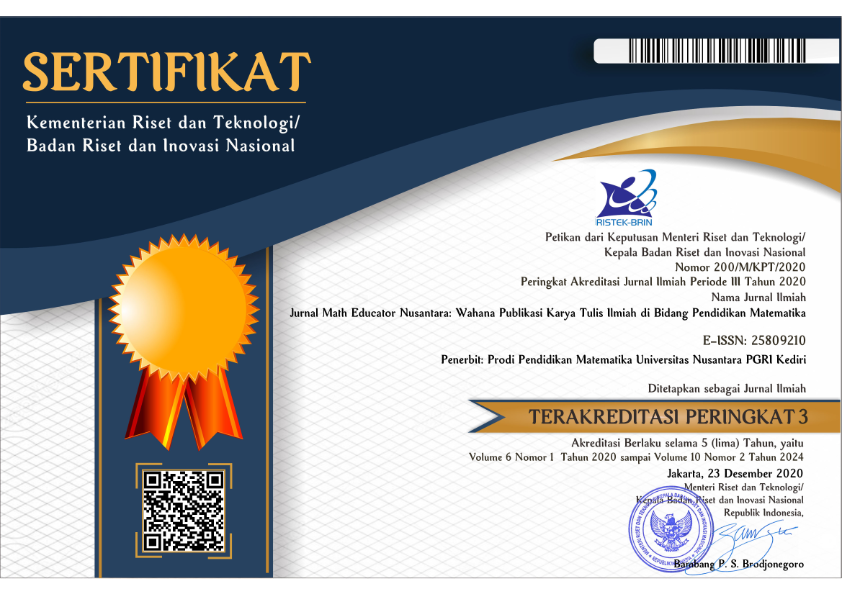Profile of SPLDV problem solving based on apos theory in terms of students' mathematical abilities
DOI:
https://doi.org/10.29407/jmen.v10i1.22260Keywords:
Problem Solving, APOS Theory, SPLDVAbstract
This research was conducted to obtain descriptions of students in solving systems of two-variable linear equations (SPLDV) based on APOS theory in terms of mathematical ability. This type of research is descriptive with a qualitative approach. The subjects in this research were 3 students in class VIII B of SMPN 20 Palu in the odd semester 2023/2024 consisting of 1 student with high mathematics ability, 1 student with moderate mathematics ability, and 1 student with low mathematics ability. Data in the research were collected through written tests and interviews with subjects. The research results show that: (1) Students with high mathematical abilities can solve SPLDV questions by achieving all stages of APOS theory (action, process, object, and scheme); (2) Students with moderate mathematical abilities can solve SPLDV questions but have not been able to reach all stages of APOS theory, students with moderate mathematical abilities are only able to reach the APO stage (action, process and object); (3) Students with low mathematical abilities have not been able to solve SPLDV questions and are only able to reach the action stage at the APOS theory stage.
References
Anjelina, Z., Usman, U., & Ramli, M. (2021). Students’ Metacognitive Ability Mathematical Problem-Solving through the Problem-based Learning Model. Jurnal Didaktik Matematika, 8(1), 32–44. https://doi.org/10.24815/jdm.v8i1.19960
Arikunto, S. & Jabar,C.S.A. (2009). Evaluasi Program Pendidikan. Jakarta: Bumi Aksara.
Dubinsky, E. (2000). Using a Theory of Learning in College Mathematics Courses. MSOR Connections, 1(2), 10–15. https://doi.org/10.11120/msor.2001.01020010
Dubinsky, E., & McDonald, M. A. (2001). A Constructivist Theory of Learning in Undergraduate Education Research. The Teaching and Learning of Mathematics at University Level, 7(3), 275–282. http://www.springerlink.com/content/v213717886v31357/
Evani, R. T. (2017). Analisis Pemahaman Siswa Berdasarkan Teori APOS (Action, Process, Object Dan Schema) Pada Materi Persamaan Linier Satu Variabel Di Kelas VII MTS Al-Ma’arif Tulungagung Semester II Tahun Ajaran 2016/2017, 3(2017), 15–31. http://repository.umy.ac.id/bitstream/handle/123456789/10559/BAB II.pdf?sequence=6&isAllowed=y
Febriana, C., & Budiarto, M. T. (2013). Profil Kemampuan Siswa SMA dalam Menyelesaikan Soal Fungsi Kuadrat berdasarkan Teori APOS Ditinjau dari Perbedaan Kemampuan Matematika. MATHEdunesa, 2(3), 1–7.
Fitriani, M., Murdiana, I. N., & Rochaminah, S. (2021). Profil Koneksi Matematis Siswa Kelas Viii Smp Negeri 4 Palu Dalam Menyelesaikan Masalah Pada Materi Teorema Pythagoras Ditinjau Dari Kemampuan. Jurnal Elektronik Pendidikan Matematika Tadulako, Vol. 8 No., 420–434.
Guci, A. A. J., Ismaimuza, D., & Paloloang, B. (2020). Profil Kemampuan Siswa Ma Alkhairaat Pusat Palu Dalam Menyelesaikan Soal Integral Berdasarkan Teori Apos. Jurnal Elektronik Pendidikan Matematika Tadulako, 7(4), 343–352. https://jurnal.fkip.untad.ac.id/index.php/jpmt/article/view/543/655
Indrawati, Ristina. 2017. Profil Pemecahan Masalah Matematika Ditinjau dari Gaya Belajar. APOTEMA: Jurnal Program Studi Pendidikan Matematika, Volume 3, No. 2, Juli 2017
Julaeha, S., & Fathani, A. H. (2020). PROFIL KEMAMPUAN KONEKSI MATEMATIS PESERTA DIDIK DENGAN KEMAMPUAN MATEMATIKA TINGGI DALAM MENYELESAIKAN SOAL CERITA KUBUS DAN BALOK. Jurnal Penelitian, Pendidikan, dan Pembelajaran, 15(33).
Melani Khomsah, (2016). Analisis pemahaman siswa materi bangun ruang kelas vii smp berdasarkan teori apos ditinjau dari aktifitas belajar siswa
Musyafa, M., Warsali, W., Milah, C. S., Aliyudin, A., Supianti, I. I., & Amam, A. (2020). Pendekatan Contextual Teaching and Learning (Ctl) Untuk Meningkatkan Pemahaman Matematik Siswa Pada Materi Aritmatika Sosial. Teorema: Teori Dan Riset Matematika, 5(1), 69. https://doi.org/10.25157/teorema.v5i1.3263
Nafi’an, M.I., dkk. (2017). Kemampuan Siswa PGSD Dalam Mengkonstruksi Pemahaman Konsep Aljabar Berdasarkan Teori APOS. Jurnal Reflektif Edukatika, (Online), Vol. 8, No 1, (http://jurnal.umk.ac.id/index.php/RE, diakses pada 13 Desember 2018).
Nuzulul Muttaqin, M., Wulandari, S., Erni Hendrawati, N., Susanti, E., Pendidikan Matematika, M., & Maulana Malik Ibrahim Malang, U. (2019). Profil Kemampuan Matematika Siswa Dalam Menyelesaikan Masalah Persamaan Garis Lurus Berdasarkan Teori Apos. Prosiding Sendika, 5(1), 206.
Palias, F., & Mampouw, H. L. (2020). Profil APOS siswa SMP dalam Menyelesaikan Soal Fungsi Linear dan Grafiknya. Jurnal Cendekia : Jurnal Pendidikan Matematika, 4(2), 964–975. https://doi.org/10.31004/cendekia.v4i2.231
Pramiandar, G. A. (2020). Profil Kemampuan Siswa Dalam Menyelesaikan Masalah Fungsi Kuadrat Berdasarkan Teori Apos (Action, Process, Object, Schema) Ditinjau Dari Gaya Belajar (Doctoral dissertation).
Rachmawati, D. A., & Siswono, T. Y. E. (2020). Impulsive and Reflective Students’ Understanding To Linear Equations System: an Analysis Through Apos Theory. MATHEdunesa, 9(1), 128–135. https://doi.org/10.26740/mathedunesa.v9n1.p128-135
Rudtin, N. A., Djaeng, M., & Ismaimuza, D. (2017). Profil Regulasi Kognisi Siswa Smp Negeri 2 Palu Dalam Memecahkan Masalah Matematika Ditinjau Dari Gaya Kognitif. Mitra Sains, 5(4), 70–82. http://103.245.72.41/index.php/MitraSains/article/view/99%0Ahttp://103.245.72.41/index.php/MitraSains/article/download/99/54
Saputri, R. A. (2019). Analisis Pemecahan Masalah Soal Cerita Materi Perbandingan Ditinjau Dari Aspek Merencanakan Polya. Wacana Akademika: Majalah Ilmiah Kependidikan, 3(1), 21–38. http://jurnal.ustjogja.ac.id/index.php/wacanaakademika/article/download/3267/2335
Shintawati, E., & Jupri, A. (2018). Analysis of students’ incorrect answers at triangle materials in the fifth-grade of primary school. Journal of Physics: Conference Series, 1013(1). https://doi.org/10.1088/1742-6596/1013/1/012145
Syaharuddin. (2016). Pemecahan Masalah matematika dalam Hubungannya dengan Pemahaman Konsep Ditinjau dari Gaya Belajar siswa kelas VIII SMPN 4 Binamu Kabupaten Jeneponto. Deskripsi Kemampuan Pemecahan Masalah Matematika Dalam Hubungannya Dengan Pemahaman Konsep Ditinjau Dari Gaya Belajar Siswa Kelas VIII SMPN 4 Binamu Kabupaten Jeneponto, 147(March), 11–40.
Wardhani, S. ; R. (2011). Instrumen penilaian hasil belajar matematika SMP: Belajar dari TIMSS dan PISA. Kementrian Pendidikan Nasional Badan Pengembangan Sumber Daya Manusia Pendidikan dan Penjamin Mutu Pendidikan Pusat Pengembangan dan Pemberdayaan Pendidikan dan Tenaga Kependid. ). Instrumen Penilaian Hasil Belajar Matematika SMP: Belajar Dari TIMSS Dan PISA. Kementrian Pendidikan Nasional Badan Pengembangan Sumber Daya Manusia Pendidikan Dan Penjamin Mutu Pendidikan Pusat Pengembangan Dan Pemberdayaan Pendidikan Dan Tenaga Kepen.
Zuyyina, H., Wijaya, T. T., & Senjawati, E. (2018). Materi Lingkaran. 4(2), 79–90.
Downloads
Published
Issue
Section
License
Authors who publish with this journal agree to the following terms:
- Copyright on any article is retained by the author(s).
- The author grants the journal, the right of first publication with the work simultaneously licensed under a Creative Commons Attribution License that allows others to share the work with an acknowledgment of the work’s authorship and initial publication in this journal.
- Authors are able to enter into separate, additional contractual arrangements for the non-exclusive distribution of the journal’s published version of the work (e.g., post it to an institutional repository or publish it in a book), with an acknowledgment of its initial publication in this journal.
- Authors are permitted and encouraged to post their work online (e.g., in institutional repositories or on their website) prior to and during the submission process, as it can lead to productive exchanges, as well as earlier and greater citation of published work.
- The article and any associated published material is distributed under the Creative Commons Attribution-ShareAlike 4.0 International License













